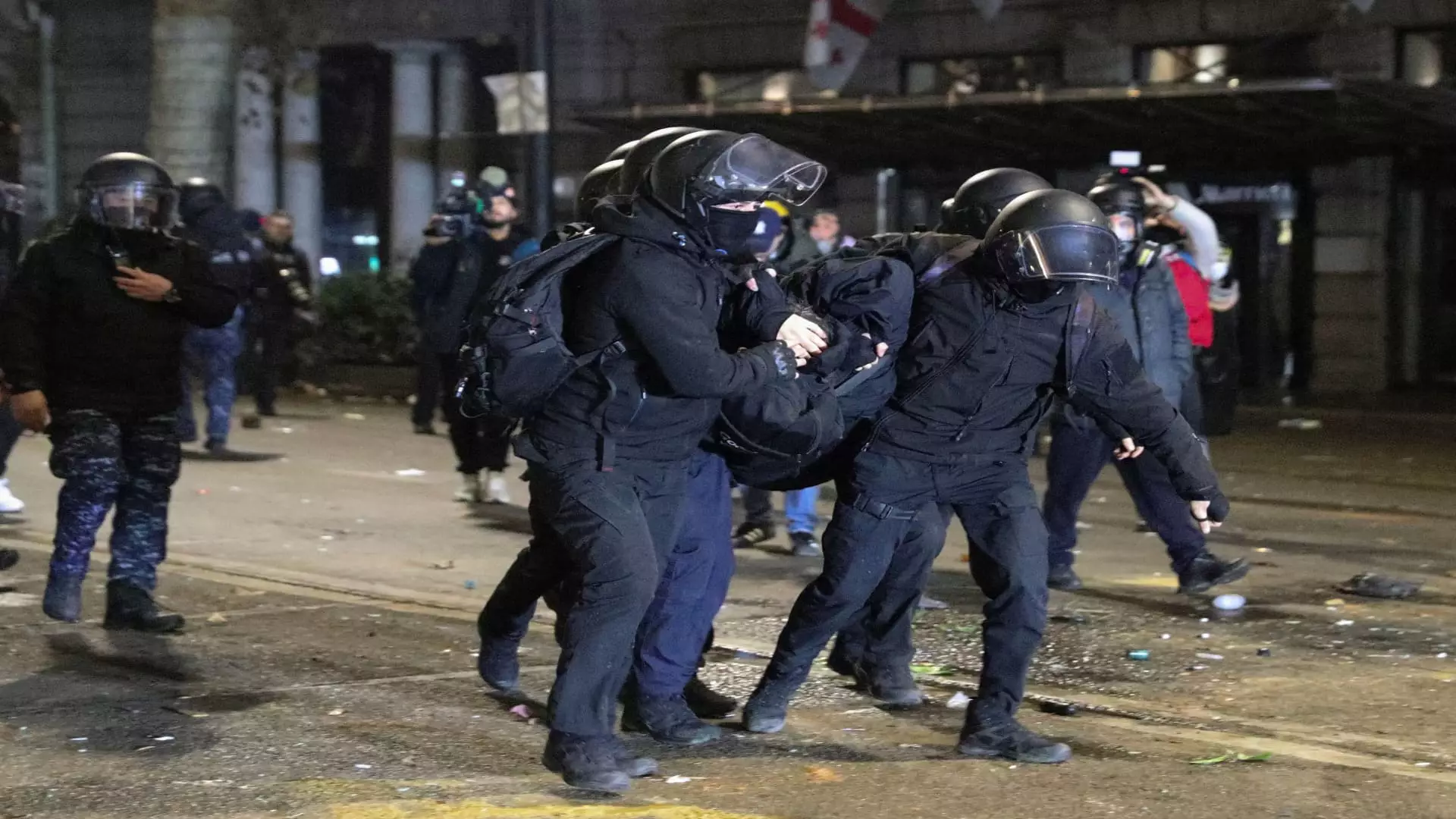On a seemingly ordinary weekend in Tbilisi, Georgia, an outpouring of public discontent erupted into a significant protest, fueled by the government’s abrupt suspension of negotiations aimed at joining the European Union. The pro-European sentiment that has flourished in this Caucasian nation has clashed with its government’s increasingly authoritarian practices. Over the course of three days, what began as a peaceful demonstration transformed into a scene of chaos, culminating in violence that forced 44 individuals into the hospital, including 27 protesters, 16 police officers, and a media worker. The response from Georgia’s leadership reveals the growing rift between the government and the populace, raising questions about the future of democratic governance in the country.
The protests reached a fever pitch on Saturday night, where tens of thousands congregated outside the parliament in a tense standoff with police. Demonstrators voiced their frustration by throwing stones and igniting fireworks, reflecting a deep dissent that has been simmering since the recent parliamentary elections held on October 26. These elections, which were perceived to be marred by manipulation and unfair tactics, acted as a catalyst for unrest. The discontent was poignantly symbolized by protesters burning an effigy of Bidzina Ivanishvili, the billionaire founder of the ruling Georgian Dream party, whose shadowy influence and ties to Russia have become focal points of frustration for many citizens seeking a European future.
In the wake of the unrest, Prime Minister Irakli Kobakhidze delivered a stern warning to protestors, threatening severe consequences for any breaches of law. His assertion that Georgia’s path toward European integration had not been obstructed stands in stark contrast to the widespread public perception. Indeed, the timing of the government’s decision to pause EU negotiations coincided with a critical resolution from the European Parliament, which condemned the recent elections as “neither free nor fair.” This juxtaposition raises alarming questions regarding the current administration’s commitment to democratic principles and transparency.
Andrew Bennett, a political analyst, noted that Kobakhidze’s statements diverged drastically from the sentiments expressed by EU officials, who voiced serious concerns regarding the direction Georgia is heading. The EU’s repeated calls for the respect of fundamental rights, alongside their prediction of increasing democratic backsliding, paint a troubling picture of Georgia’s political landscape.
As these tensions unfold, the country’s opposition quadrants continue to cry foul, claiming that Russian influence lurks behind the scenes, aiming to drag Georgia back into its geopolitical fold. President Salome Zourabichvili, a figurehead for Georgian aspirations towards the West, characterized the current regime’s actions as pushing the nation towards becoming a “quasi-Russian” state, underscoring the political and ideological schism in Georgian society. The opposition’s demands for new elections—conditions ensuring authentic representation of the people’s will—highlight the urgency for a reset in the political order.
In this tumultuous scenario, the enduring aspirations of the Georgian populace to integrate with Europe stand starkly opposed to the ruling government’s increasingly autocratic tendencies. The opposition argues that the situation is not merely about choosing a closer relationship with the EU, but about preserving the democratic fabric of the nation itself.
The path forward for Georgia remains riddled with uncertainty. With the European Union having granted candidate status to the nation on the condition that it comply with specific reforms, the ruling party’s recent actions have thwarted progress. The notion of suspending negotiations has prompted a reevaluation of Georgia’s geopolitical position and its democratic integrity.
As grassroots movements continue to challenge the status quo, the voices of the Georgian people echo a broader plea for accountability, security, and the right to shape their own future. The outcome of this pivotal moment could very well define Georgia’s trajectory in both the European sphere and the local political domain for years to come.
What began as a singular act of discontent has transformed into a comprehensive movement advocating for justice, representation, and alignment with European values—qualities that will ultimately dictate the nation’s state and its people’s fate.


Leave a Reply